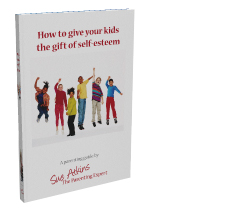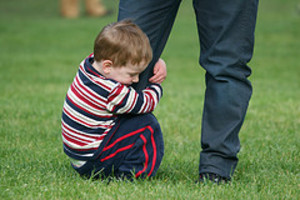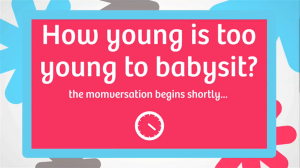How To Ruin Your Life (Without Even Noticing That You Are)

A great Pause To Ponder ……
The Sue Atkins Weekly Parent Coaching Question
As it’s Valentine’s Day I thought it would be a good opportunity to pause when you are stressed, frustrated, angry or tired and to just STOP and ask yourself:
What would love do now ?
Download your copy of Sue’s Ebook
How to give your kids the gift of self-esteem by clicking here
About the author
Sue Atkins is a Parenting Expert who offers practical guidance for bringing up happy, confident, well behaved children. She is also the author of “Raising Happy Children for Dummies” one in the famous black and yellow series published worldwide and the highly acclaimed Parenting Made Easy CDs. She regularly appears on BBC Breakfast and The Jeremy Vine Show on BBC Radio 2 and her parenting articles are published all over the world.
Join me on these networks
Sue Atkins the Parenting Expert
T: + 44 1342 833355 M: 07740 622769
www.sueatkinsparentingcoach.com
Gatehouse Farm
The Farmhouse
New Chapel
Surrey RH7 6LF
Six Needs of Every Successful Relationship
Keeping the Glow with your Partner.
Although most of us desire a healthy relationship it’s surprising how many of us don’t really understand what makes love survive long term. Most of us are bombarded with images of love and sex in magazines, TV adverts, and on the radio but often they idealise, romanticise or trivialise love. So it’s hard to work out what the keys to lasting passion and love are.
So much is written about it yet it is an emotion that gets the least attention within families and schools. We’re not taught about it – we just seem to either catch it, pick it up as we go along, or copy our own mum and dad’s relationship!
Yet there is perhaps no greater source of happiness, joy and fulfilment or heartache, despair or pain than love.
Keeping the glow with your partner is not easy and no matter where you are in your relationship it’s important to regularly check in on it from time to time to keep it fresh, keep it growing and keep it watered and nurtured.
With just a slight shift in your perceptions and beliefs about marriage and partnerships you can re-kindle the flame of love, re-ignite intimacy and fan the flames of passion if you are open and willing to give it a go.
Interestingly, we say we love the people in our lives, yet we often don’t act very lovingly with our words, our tone of voice or our body language or our attitude towards the very people who are the most important to us, and it’s ironic that no amount of money, success, status or fame will ever come close to the warm glow of a loving and nurturing relationship.
“Women are afraid to ask for what they want because they are afraid at a deep subconscious level that they will get replaced by someone less demanding and more compliant and men don’t even acknowledge that they want or need anything because if they do, it implies that they are not a real man. So we have two people sitting around wanting all these things from each other, probably capable of giving each other many of them, but not talking about it. Then they both feel depressed, both feel resentful, both feel deprived, they cheat on each other and you have a divorce. It could be prevented by straight talking and clear asking.”
Barbara De Angelis Best-selling author and renowned relationship expert
The Driving Force of All Human Needs
All of us are driven by the same basic human needs in some form or other and working out what your own needs are first is a great place to start if you want a truly fulfilling and meaningful relationship.
There are six levels of basic needs in life, and each level supports the next one like the layers in a pyramid. If one need is not being met, it is very difficult to have a truly fulfilling relationship.
There are four primary needs (certainty, variety, significance and love) and two spiritual needs (growth and contribution) but the key element in a happy and successful relationship is in getting our needs met in the way we value them the most.
The problem, or the challenge in a relationship, is that we all differ in the order of priority we put these needs in and in how we value each of them in our lives.
So if you value security and certainty first in your list of needs you can see how you’d find it challenging to be in a relationship with a person who loves uncertainty or lots of variety in their life.
The secret is to understand where you truly are, where you feel most comfortable and then to think about how that influences your life and relationship so you can learn how to expand the choices that are available to you.
If you don’t fulfil your needs then you feel off kilter, out of balance and unhappy.
When you know what you genuinely need you can work out how to go about getting your needs met yourself and by also talking them through with your partner so you can fulfil their needs as well.
The secret is know what your needs are and in what order of importance and then to take a little time to explain what they are to your partner – and watch your relationship flourish.
Grab a pen and paper to jot down your thoughts as you ponder over the next week or so
Need One: The Need for Certainty
People who need certainty like consistency, control, safety, security and routines and to avoid uncertainty they often resort to controlling behaviour to try and feel safe and in control of most situations.
• Think about all the ways you currently get certainty in your life at the moment.
• Are these needs being fully met?
• How could you get them met?
Need Two: The Need for Variety/Uncertainty
People who need uncertainty like surprises, diversity, difference, excitement, and challenges and find too many routines dull, lifeless and boring. They may even “pick a fight” to get some reaction that’s unpredictable and stimulating as they love taking on new challenges.
• Think about all the ways you currently get uncertainty/variety in your life at the moment.
• Are these needs being fully met?
• How could you get them met?
Need Three: The Need for Significance
People who need significance have a sense of being needed and of feeling important and unique and noticed. They need to have a sense of purpose and meaning in their lives.
This can lead to them accumulating material possessions, academic success or even a keenness to keep developing their skills and knowledge. They like to have their accomplishments noticed and recognised and may get their need for significance through their children. It’s not about showing off but it is about feeling recognised for their value and accomplishments.
• Think about all the ways you currently get significance in your life.
• Are these needs being fully met?
• How could you get them met?
Need Four: The Need for Connection and Love
People who need to feel love and connection enjoy sharing and intimacy, and a sense of feeling part of…. They enjoy bonding spiritually as well as physically and like to feel at one with another person. They enjoy the sense of meaning love and connection can give them. If this need isn’t met the can often take refuge in negative destructive behaviour like drinking too much, smoking or getting into gangs if they are young, or find themselves self sacrificing their own needs to get a sense of connection with another.
• Think about all the ways you currently get connection and love in your life at the moment.
• Are these needs being fully met?
• How could you get them met?
Need Five: The Need for Growth
People who need growth enjoy expanding their knowledge, comfort zones and friendships. They enjoy self development and learning about themselves and what they are capable of and they enjoy their relationship moving forward, expanding and growing not stagnating and staying still.
Relationships can either see one partner growing, changing and going off in a different direction or see one partner growing, changing and growing at a different speed. The secret is to recognise what’s happening and to talk about it and to work out ways you can grow, change and keep together.
• Think about all the ways you currently get the need for growth in your life at the moment.
• Are these needs being fully met?
• How could you get them met?
Need Six: The Need for Contribution
People who need contribution in their lives feel the need to give back and to share their expertise, knowledge, time or money to help their community, their business, their family, their school, or a charity or the world as a whole. They have a need to feel unity with others and to make a difference in the world in some small or large way.
• Think about all the ways you currently get the need to contribute in your life at the moment.
• Are these needs being fully met?
• How could you get them met?
Getting more of what you need
• At the moment which of the Six Needs are you really looking for?
• Which ones are the most important in your life?
• How can you begin to identify better, maybe even healthier, ways to get them met?
If you’re ever going to be happy in your relationship, it’s important to ensure that your emotional needs are being fully met. Your partner doesn’t need to meet 100% of your needs but they will almost certainly need to support all of the important ones for you to be truly happy in your relationship.
Getting your needs met is essential if you ever intend to find your love for Life but don’t expect your partner to be able or willing to fulfil every one of your needs. No one person can do that.
Different friends, family, and work colleagues and having different hobbies and interests with different people can all contribute to fulfilling your needs. So open up to all the possibilities that life can offer you and don’t place too many demands on any one person.
Take responsibility for fulfilling your own needs.
Everything you want and need is waiting for you so just start recognising what you need, ask for it to be met and embrace life and love with both arms wide open.
February is Pass It Forward Month! So if you have found this blog helpful and thought provoking please pass it forward to your friends, colleagues, schools and nurseries……. because as they say
….“Alone we can do so little together we can do so much”
Download your copy of Sue’s Ebook
How to give your kids the gift of self-esteem by clicking here
About the author
Sue Atkins is a Parenting Expert who offers practical guidance for bringing up happy, confident, well behaved children. She is also the author of “Raising Happy Children for Dummies” one in the famous black and yellow series published worldwide and the highly acclaimed Parenting Made Easy CDs. She regularly appears on BBC Breakfast and The Jeremy Vine Show on BBC Radio 2 and her parenting articles are published all over the world.
Join me on these networks
Sue Atkins the Parenting Expert
T: + 44 1883 818329 M: 07740 622769
Coping with school phobia
Many children at some time in their school career find going to school a challenge and may feel anxious, stressed, or overwhelmed.
School phobia (known to may professionals who work with children as school refusal), is a complex and extreme form of anxiety about going to school (but strangely may not be attached to the school itself as the name suggests)
It can be brought on by a bad experience, either with a teacher or with other children or can be related to a “traumatic” experience like being bullied, asked to stand up and read in class, or made to speak or sing at assembly, or when someone has laughed at them for a mistake.
The most common symptoms include stomach-aches, nausea, fatigue, shaking, a racing heart and frequent trips to the toilet.
Young children up to the age of 8, that suffer school phobia experience separation anxiety and find it really difficult to be parted from their parent or main carer.
In older children social phobia can manifest itself in anxiety about their performance in regular school activities such as during games, or drama or in tests and exams.
Children with anxieties about going to school may suffer a panic attack if they are forced to go and it can start off a vicious circle which then makes them fear having another panic attack and there is an increasing spiral of worry with which parents often don’t know how to deal.
How Does School Phobia Start?
Going to school for the first time can be a period of great anxiety for very young children. Many will be separated from their parents for the first time, or will be separated all day for the first time.
This sudden change can make them feel very anxious and they may suffer from a feeling of separation anxiety.
Children, who have never been to a nursery or playgroup, are probably unused to having their entire day organised for them and they may be very tired by the end of the day. This causes them to feel further stress and makes them feel very vulnerable and tearful with a sense of overwhelm and they may build up an aversion to going to school.
For older children who are not new to the school, who have had a long summer holiday or have had time off because of illness, returning to school can be quite a traumatic experience. They may no longer feel at home there. Their friendships might have changed. Their teacher and classroom might have changed. They may have got used to being at home and closely cared for by their parents, so they suddenly feel insecure when all this attention and support is removed and they find themselves back in the hurly burly of school life again.
Other children may have felt unwell on the school bus or in school and associate these places with further illness and symptoms of panic, and so they want to avoid them in order to avoid the panicky symptoms and panic attacks fearing, for example that they may vomit, faint or have diarrhoea again.
The “traumatic” or negative experience has been anchored in their mind as a bad experience so every time they find themselves back in that situation it brings back all the bad negative memories and they panic.
A negative anchor or a negative association has been made and an “anchor” is when your mood changes in response to some trigger or stimulus and your unconscious registers it every time you see it, hear it or feel it (which is a bit like going to the fridge to get a snack after seeing an advert on the tv or like jumping up at a party when your favourite song comes on that reminds you of going to college, someone’s birthday or a romance that’s become “our song”!)
Here are the most common possible triggers for school phobia:
1. Being bullied.
2. Starting school for the first time.
3. Moving to a new area and having to start at a new school and make new friends or just changing schools.
4. Being off school for a long time through illness or because of a holiday.
5. Bereavement (of a person or pet).
6. Feeling threatened by the arrival of a new baby.
7. Having a traumatic experience such as being abused, being raped, having witnessed a tragic event.
8. Problems at home such as a member of the family being very ill.
9. Problems at home such as marital rows, separation and divorce.
10. Violence in the home or any kind of abuse; of the child or of another parent.
11. Not having good friends (or any friends at all).
12. Being unpopular, being chosen last for teams and feeling a physical failure (in games and gymnastics).
13. Feeling an academic failure.
14. Fearing panic attacks when travelling to school or while in school.
Some children have a particular susceptibility to school phobia because of a medical condition such as Asperger Syndrome and Attention Deficit Hyperactivity Disorder. Children with Asperger Syndrome need to be dealt with differently to children without the syndrome as, for example, teaching them relaxation techniques can actually make them more anxious.
How to Help:
The longer school phobia goes on, the harder it is to treat so referrals to Child and Adolescent Mental Health Services are usually quite quick to ‘nip it in the bud’. However, if your child is severely affected, it is better to ask for a referral (from your child’s doctor or head teacher) to the service before you are desperate as it is often overstretched: in reality it can take some time to get an appointment.
Things you can do yourself as a parent include getting help from your child’s school. Teachers need to be aware there is a problem. Sometimes being taught in a special unit in school, if the school has one, may help your child feel more secure as it is a cosier place and acts as a half-way point between home and school.
Some children are so severely affected that they stop going to school altogether. It should be made quite clear to your child’s teachers that they are not ‘playing up’ but that their anxiety is very real and they are suffering from it.
I always advise the parents that I work with to step back and imagine a camcorder is sitting on their shoulder noticing how they react to their child and the circumstances as often the child has picked up their parents anxiety and reacts to that too, making things much worse.
At home, life should continue as normal with all your normal routines and activities. In fact that can really help calm things down. But you might find that your child wants to stop going out, especially without you, even to parties that they were quite happy being left at before.
Although you need to deal sensitively with this, it’s best to help your child through this transition by going by going with them for part (or all) of the time so that their world does not shrink altogether while they build back their confidence.
It is also helpful to:
• Reassure your child. Keep a diary of the triggers and what is the main thing that brings on the feelings of anxiety so you can be aware of them.
• Explain that their fears are brought on by thoughts that are not maybe completely true thoughts so you create doubt in what they are thinking so you can turn down those scary voices. I often get the child to imagine they have a remote control button and can “turn down” the nasty, scary voices in their heads so they can’t hear them so loudly. Then we make the scary voices sound like Donald Duck – really silly and daft so they start to laugh at the scary voices– knocking out the hold those scary voices have over them.
• I also do a technique called the Circle of Confidence where the child imagines a lovely bright circle in front of them. They choose a colour which represents confidence to them and as they step into the circle the colour starts to spin all the way up and down through their body from the top of their head to the tip of the toes spinning faster and faster, giving them the feelings of confidence throughout their whole body.
I also use EFT (Emotional Freedom Technique) to “tap” away their phobia which I have found to be the quickest way to alleviate school phobia and anxiety. For more information on EFT go to my Positive Parents Club to download my free ebook called “EFT Questions and Answers”
• Keep to the same routines as it builds confidence, predictability and security.
• Learn to relax yourself and find simple ways for your child to relax and make life predicable for your child so that they have less to be anxious about. (No sudden surprise trips out !)
• Deliberately look for things that your child can look forward to each day to keep them in a positive and upbeat mindset and don’t encourage lots of negative thinking and language to creep in that brings their confidence down.
• Encourage your child to find small and specific things that they can enjoy in the school day as it gives them hope and confidence and a new more positive attitude and mindset.
Click here to buy my critically acclaimed “Parenting Made Easy TAPPING cards – success at your fingertips” designed to alleviate anxiety , fear and stress in children of all ages.
Download your copy of Sue’s Ebook
How to give your kids the gift of self-esteem by clicking here
About the author
Sue Atkins is a Parenting Expert who offers practical guidance for bringing up happy, confident, well behaved children. She is also the author of “Raising Happy Children for Dummies” one in the famous black and yellow series published worldwide and the highly acclaimed Parenting Made Easy CDs. She regularly appears on BBC Breakfast and The Jeremy Vine Show on BBC Radio 2 and her parenting articles are published all over the world.
Join me on these networks
Sue Atkins the Parenting Expert
T: + 44 1342 833355 M: 07740 622769
www.sueatkinsparentingcoach.com
Gatehouse Farm
The Farmhouse
New Chapel
Surrey RH7 6LF
Simple and practical ideas to avoid teary and tantrum-filled goodbyes.
I’ve been answering toddler questions for a regular feature that I write for an In -house magazine in the City – in fact I was inundated and had over 40 questions all about toddlers so I am looking forward to launching my new Parenting Made Easy – Toddler Membership System in the next couple of months as there is clearly a need for some support, reassurance and some practical tips for bringing up happy, well behaved toddlers !
One on the questions I answered was about a toddler clingying to Mum and not even letting her go to the loo which is a very common problem so here is the article I wrote to answer some of those concerns.
I work with many parents of toddlers going through the separation anxiety phase.
It can be a tough time for both of you but I think it helps to know that this is a very common part of a child’s early year’s development.
Around their first birthday, many children develop separation anxiety, and get upset when you try to leave them with someone else, and although separation anxiety is a perfectly normal part of childhood development, it can be a really upsetting and unsettling experience for both of you.
Understanding what your child is going through and having a few coping strategies can help both of you get through it.
How Separation Anxiety Develops
Babies adapt pretty well to other people caring for them. I find it’s often the parents who suffer anxiety about being separated more than the infants do!
As long as their needs are being met, most babies younger than 6 months adjust easily to other people.
Sometime between 4-7 months, babies develop a sense of “object permanence” and begin to learn that things and people exist even when they’re out of sight.
This is when babies start playing the “dropping” game of — dropping things over the side of the high chair and expecting you to keep on getting it. I remember this phase well when my son was a baby!
The same thing occurs with a parent.
Babies realise that there’s only mum or dad, and when they can’t see you, that means you’ve gone away. And because babies and toddlers most don’t yet understand the concept of time, they don’t understand that you’ll come back.
They think you’ve gone for good!
Whether you’re in the kitchen, in the next bedroom, or at the office, it’s all the same to your young toddler.
You’ve disappeared, and your child will do whatever he or she can to prevent this from happening.
Stresses Can Trigger Anxiety
Between 8 months old 1 year old, children grow into more independent toddlers, yet they are even more uncertain about being separated from you as you have bonded.
This is when separation anxiety can often develop, and a child may become agitated and upset when you try to leave.
Whether you need to go into the next room for just a few seconds, leave your child with a babysitter or grandparent for the evening, or drop off your child at day care, your little one might now start reacting by crying, clinging to you, and resisting attention from others.
Because children develop at their own speed, the timing of separation anxiety can vary widely from child to child.
Some toddlers may go through it later, between 18 months and 2½ years of age. Some may never experience it.
And for others, certain life stresses can trigger feelings of anxiety about being separated from you – common ones being a new child care situation or carer, the arrival of a new sibling, moving to a new home, going into a big bed, divorce or tension at home.
How long does separation anxiety last?
It varies, depending on your toddler and how you respond. If you are tense, anxious and uneasy your toddler will pick up on your vibes and this will make it all worse.
So try to relax, picture things going well and easily and that in a short time this will soon pass.
Keep the bigger picture in your mind.
Otherwise toddlers soon learn do understand the effect this behaviour has on you. If you come running back into the room every time your child cries and then stay there longer and longer or cancel your plans, your child will continue to use this tactic to avoid separation.
It’s best to smile, hug and leave quickly.
In some cases, depending on your child’s temperament, separation anxiety can last from infancy through the primary school years.
I remember when I was a Reception Class teacher and the “BIG Day” arrived for starting school for the first time. Often the children cried for about 5 minutes while they got used to the new routine and felt sad at the separation but within minutes they were playing with the sand or water or toys and were relaxed and comfortable – but their parents often went off feeling guilty and anxious and ended up worried all morning when really the separation anxiety only lasted a few minutes and disappeared after a short time.
What You May Be Feeling
During this stage, you might experience different emotions.
It can be reassuring to feel that your child is as attached to you as you are to them. But you’re likely to feel guilty about taking time out for yourself, leaving your child with a carer, or about going to work. And you may start to feel overwhelmed by the amount of attention your child seems to need from you.
I’ve even coached mums exasperated about not being able to even go to the toilet without a toddler following them and crying if they leave.
So it’s important to try and get some adult “me” time in the evenings to keep your sense of perspective.
Keep in mind that your little one’s unwillingness to leave you is a good sign that healthy attachments have developed between the two of you.
Eventually, your child will be able to remember that you always return after you leave, and that will be enough comfort and reassurance while you’re gone. This also gives your toddler a chance to develop their own coping skills and a little independence.
Making Goodbyes Easier
These strategies can help ease you and your toddler through this difficult period.
- Timing is everything. Try not to start day care or child care with an unfamiliar person when your little one is between the ages of 8 months and 1 year, when separation anxiety is first likely to appear.
Also, try not to leave when your toddler is likely to be tired, hungry, or restless. If at all possible, schedule your departures for after naps and mealtimes.
- Practice. Practice being apart from each other, and introduce new people and places gradually. If you’re planning to leave your child with a relative or a new babysitter, then invite that person over in advance so they can spend time together while you’re in the room.
If your child is starting at a new day care centre or nursery, make a few visits there together before a full-time schedule begins. Practice leaving your child with a carer for short periods of time so that he or she can get used to being away from you.
- Be calm and consistent. Create an exit ritual where you say a pleasant, loving, and firm goodbye. Stay calm and show confidence in your child. Reassure them that you’ll be back — and explain how long it will be until you come back – say something like “I’ll be back in 2 of your favourite CBBIES programmes” using concepts your toddler understands like “after lunch” because your child can’t yet understand time. Give them your full attention when you say goodbye, and when you say you’re leaving, mean it; coming back will only make things worse.
- Follow through on promises. It’s very important to make sure that you return when you have promised to. This is critical — this is how your child will develop the confidence that he or she can make it through the time apart. So don’t let them down – it will frighten them.
As hard as it may be to leave a child who’s screaming and crying for you, it’s important to have confidence that the carer can handle it. It may help both of you to set up a time that you will call to check in, maybe 15 to 20 minutes after you leave. By that time, most toddlers have calmed down are playing with other things. Don’t let yourself give in early and call sooner!
If you’re caring for another person’s child who’s experiencing separation anxiety, try to distract the child with an activity or toy, or with songs, games, or anything else that’s fun. You may have to keep trying until something just clicks with the child.
Also, try not to mention the child’s mother or father, but do answer the child’s questions about his or her parents in a simple and straightforward way. You might say: “Mummy and Daddy are going to be back as soon as they are have dinner. Let’s play with some toys!”
It’s Only Temporary
Remember that this phase will pass. If your child has never been cared for by anyone but you, is naturally shy, or has other stresses, it may be worse than it is for other kids.
Trust your instincts. If your child refuses to go to a certain babysitter or day care centre or shows other signs of tensions, such as trouble sleeping or loss of appetite, then there could be a problem with your childcare situation.
If intense separation anxiety lasts into nursery, primary school, or beyond and interferes with your daily activities, discuss it with your doctor. It could be a sign of a rare but more serious condition known as separation anxiety disorder.
Kids with separation anxiety disorder fear being lost from their family members and are often convinced that something bad will happen. Talk with your doctor if your child has signs of this, including:
panic symptoms (such as nausea, vomiting, or shortness of breath) or panic attacks before a parent leaves
nightmares about separation
fear of sleeping alone
excessive worry about being lost or kidnapped or going places without a parent
For most toddler, the anxiety of being separated from you passes without any need for medical attention. But if you have concerns, talk to your doctor.
Each night just before you fall asleep just daydream and visualise everything going really well. See what you see in great detail – notice what you are doing and what your little one is doing when it’s going really well – imagine them smiling and relaxing and hear what you hear at that time too. Notice what you say and how you say it. Notice your tone of voice and your body language when it’s going well and relax knowing that it will in time go really well.
Feel yourself being at ease and say over and over gently inside your head, “ I am grounded, centred, positive and relaxed” as this will help your body to relax and your toddler will pick this up and will take their lead from you.
Download your copy of Sue’s Ebook
How to give your kids the gift of self-esteem by clicking here
About the author
Sue Atkins is a Parenting Expert who offers practical guidance for bringing up happy, confident, well behaved children. She is also the author of “Raising Happy Children for Dummies” one in the famous black and yellow series published worldwide and the highly acclaimed Parenting Made Easy CDs. She regularly appears on BBC Breakfast and The Jeremy Vine Show on BBC Radio 2 and her parenting articles are published all over the world.
Join me on these networks
Sue Atkins the Parenting Expert
T: + 44 1342 833355 M: 07740 622769
www.sueatkinsparentingcoach.com
Gatehouse Farm
The Farmhouse
New Chapel
Surrey RH7 6LF
The Sue Atkins Weekly Parenting Affirmation
I am patient, I am loving and I always show my kids respect
Download your copy of Sue’s Ebook
How to give your kids the gift of self-esteem by clicking here
About the author
Sue Atkins is a Parenting Expert who offers practical guidance for bringing up happy, confident, well behaved children. She is also the author of “Raising Happy Children for Dummies” one in the famous black and yellow series published worldwide and the highly acclaimed Parenting Made Easy CDs. She regularly appears on BBC Breakfast and The Jeremy Vine Show on BBC Radio 2 and her parenting articles are published all over the world.
Join me on these networks
Sue Atkins the Parenting Expert
T: + 44 1342 833355 M: 07740 622769
www.sueatkinsparentingcoach.com
Gatehouse Farm
The Farmhouse
New Chapel
Surrey RH7 6LF
Here’s another one for you Dad …. The House of Lords no less !
|
|||
Would you allow your teenager to babysit your toddler?
I was on my way to work in a school yesterday when I heard the debate on The Jeremy Vine BBC Radio 2 Show about a Mum who had been given an official police caution for leaving her 14-year-old son in charge of his three-year-old brother.
I rang in to leave my thoughts but I had to go off and teach my “Beat Bullying Confidence Classes for Kids” but it got me pondering:
At what age can children be left at home alone without parental supervision?
It’s a story that would sound alarm bells for many mums and dads.
Any parent who sometimes nips out to the shops, leaving their children to look after each other, will take certainly take note.
Or with the prospect of a rare night out, the couple that offers £20 to a sensible teenage neighbour in return for keeping an eye on their little ones, may now think again.
Here’s the article from BBC News
“A mother-of-three from the Thames Valley area has been cautioned by police after leaving her 14-year-old son at home with his little brother.
Sources quoted in the Sunday Times are reported as saying the mother, in her 40s, was away for 30 minutes, the time passed without “incident” and the toddler was never in any danger.
It’s very rare to hear about cases like this, but is 14 too young to be babysitting and might more parents find themselves facing a caution?
At the heart of this is what all parents of teenagers – and anyone who has ever been a teenager – knows, that one 14-year-old can differ dramatically from another in their maturity and reliability.
The law on this is vague but the police can – and do – use their discretion in judging these cases.
There is no minimum age at which children can be left on their own, nor does the law specify how old someone needs to be to babysit. However, if the babysitter is under 16, then the parent remains legally responsible for the child’s safety.
And, under the Children and Young Persons Act, parents can be prosecuted for wilful neglect if they leave a child unsupervised “in a manner likely to cause unnecessary suffering or injury to health”. Punishment ranges from a fine to 10 years’ imprisonment.
Without legally specified ages to guide them, parents may be left scratching their heads over this grey area.
But children’s charity, the NSPCC, advises that children under 13 should not be left at home alone for long periods and children under 16 should not be put in charge of younger children.
Chris Cloke, from the NSPCC, says calls to its Childline helpline showed that being left alone to look after young children can be distressing – one 10-year-old boy called to say he had no idea how to comfort his younger brother to stop him crying.
But Mr Cloke acknowledges the difficulties facing parents making the judgement call.
“What parents need to do is move their children on so they become more independent and of course it’s a question of striking the right balance.
“What’s really important is that parents talk through with their children, discuss the issues and if they are going to leave them at home alone make sure the child feels happy about that and feels confident and knows what to do and who to contact if there’s an emergency.”
‘Best judges’
Jacqui Gilliatt, a barrister at a family law firm, says there are difficulties with bringing in an age barrier as it would only ever be arbitrary and you will never eliminate the need for agencies or authorities to step in if something came to light.
She points out that parents do not have to accept a caution, which indicates an admission of guilt. Instead, she advises seeking legal advice and perhaps putting the case before a magistrate.
Justine Roberts, of Mumsnet website, also accepts there probably isn’t a right age.
“Some Mumsnetters report having children who will never be sufficiently competent to look after a sibling – even when fully grown – but others have 12-year-olds who are hugely responsible.”
Many mothers on Mumsnet mention their own experiences of babysitting, often for money, from the age of 12 and in some cases younger.
One highlights how attitudes are different in Germany and Switzerland where children commonly walk to school alone from the age of six. The mother also says she leaves her eight-year-old and six-year-old children at home when she goes shopping.
Another says the police caution is ridiculous and asks whether a 15-year-old mother can’t look after her own child unsupervised?
Ms Roberts adds: “Ultimately the parents are the best judges, as they know both the caring child and one being cared for – and what their limits are.”
Child development specialist and author of Toxic Childhood Sue Palmer argues that parents, as well as too much legislation in the UK, are part of the problem.
“Children are becoming less competent because they are being treated like carefully protected pets.
“Unless you let them take on chores and take responsibility for their own behaviour and learn to deal with real time, space and people, you won’t be able to leave them in charge of another child.”
But she also says such state interference, including the recent threat of more criminal record checks for people working with children, means people are ceasing to use common sense and losing their own ability to judge other human beings.
“We are almost legislating ourselves into a world built on accountability procedures and bureaucracy and statistics, and that’s a very unpleasant world.”
And this is, she says, fast making the UK a laughing stock among its European neighbours, where a 14-year-old in charge of a three-year-old is considered normal behaviour.”
Download your copy of Sue’s Ebook
How to give your kids the gift of self-esteem by clicking here
About the author
Sue Atkins is a Parenting Expert who offers practical guidance for bringing up happy, confident, well behaved children. She is also the author of “Raising Happy Children for Dummies” one in the famous black and yellow series published worldwide and the highly acclaimed Parenting Made Easy CDs. She regularly appears on BBC Breakfast and The Jeremy Vine Show on BBC Radio 2 and her parenting articles are published all over the world.
Join me on these networks
Sue Atkins the Parenting Expert
T: + 44 1342 833355 M: 07740 622769
Gatehouse Farm
The Farmhouse
New Chapel
Surrey RH7 6LF









